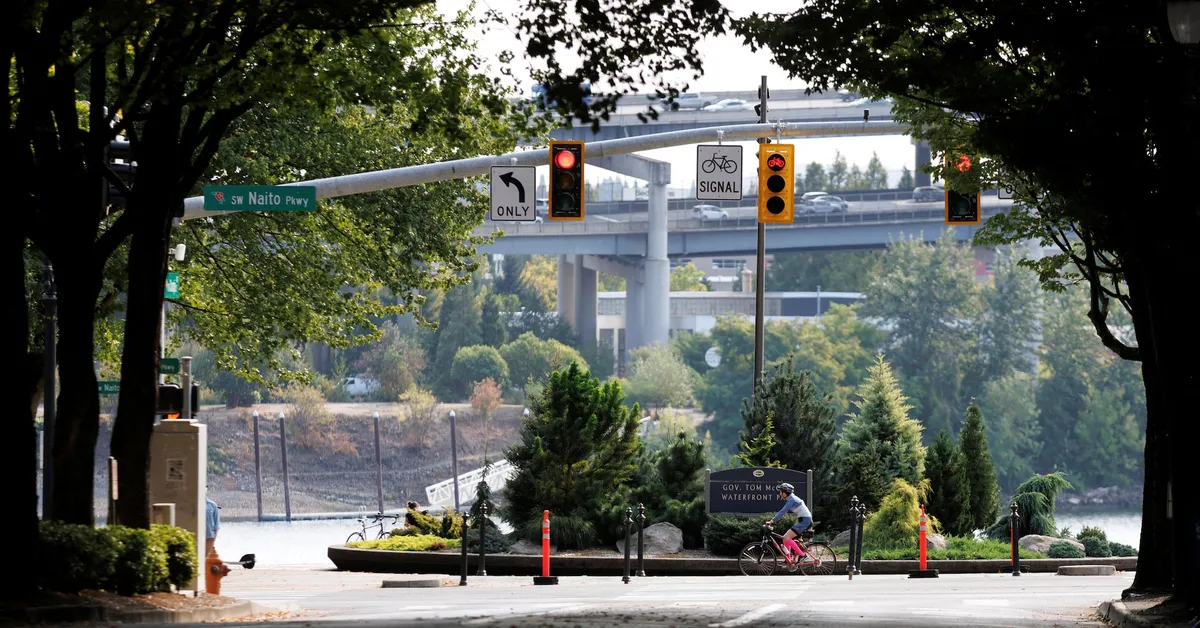
U.S. Defense Secretary Pete Hegseth announced the deployment of 200 Oregon National Guard troops under federal authority on Sunday, amid a legal challenge from the state against President Donald Trump's controversial decision to send military forces into Portland, a city governed by Democrats. The President had declared on Saturday that these troops would be utilized to protect federal immigration facilities from what he described as domestic terrorists, and he authorized them to use full force if deemed necessary.
This decision by Trump has sparked significant backlash, leading to legal battles and protests across various cities run by Democratic officials, including notable deployments in Los Angeles and Washington, D.C.. In response, Oregon's Attorney General, Dan Rayfield, filed a lawsuit in federal court in Portland on Sunday, targeting Trump, Hegseth, and Homeland Security Secretary Kristi Noem. The lawsuit alleges that Trump has overstepped his authority, using what it describes as baseless and exaggerated claims, stating that Portland is a "war-ravaged" city "under siege" from domestic threats.
The legal complaint asserts that the actions of the defendants have infringed upon Oregon’s sovereign rights to manage its own law enforcement and National Guard resources. It further highlights that protests against the Immigration and Customs Enforcement (ICE) agency in Portland have been relatively small and controlled since their inception in June. Trump's unexpected plan to deploy federal troops was met with surprise among Pentagon officials, with six U.S. officials speaking anonymously to confirm this sentiment.
On the same day, Hegseth signed a memo authorizing the deployment of 200 National Guard troops, which was later shared as an attachment to Oregon's lawsuit. In a statement, Attorney General Rayfield criticized the decision, remarking that deploying 200 National Guard troops to secure a single building, presumably an ICE facility, is not typical or justified.
Interestingly, preliminary data from the Major Cities Chiefs Association indicates that violent crime in Portland has significantly decreased in the first half of 2025. The statistics reveal a striking 51% drop in homicides compared to the same period the previous year. Despite this decline, Trump's administration has made crime a central theme of its agenda since he resumed the presidency in January, even as crime rates fall in many U.S. cities.
The backdrop to these events includes the widespread protests in downtown Portland in 2020, which were ignited by the tragic killing of George Floyd in Minneapolis by a police officer. These protests persisted for months, and several civic leaders contended that Trump's deployment of federal troops only exacerbated tensions rather than alleviating them. It remains unclear whether Trump's assertion that U.S. troops could use full force in Portland implies authorization for lethal force, and under what specific circumstances this would apply.
As the situation unfolds, Portland Mayor Keith Wilson and other Oregon officials were reportedly taken aback by Trump's order, learning of it through social media. Many Pentagon officials were similarly unprepared, describing the announcement as a sudden and unexpected development. Prior to the announcement, the military had been concentrating on planning potential deployments in other cities, such as Chicago and Memphis, as tensions over Trump's stringent immigration policies have escalated.
In light of a recent shooting at an ICE facility in Dallas, which resulted in one death and two serious injuries, the atmosphere in major U.S. cities has become increasingly charged. This incident underscores the complex dynamics surrounding immigration enforcement and the role of federal troops in urban settings.